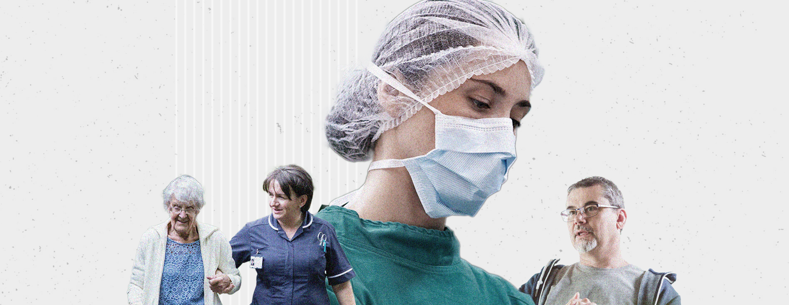Article by the Health and Social Care Committee.
Are you curious about what the Welsh Government is doing to address issues in health and social care in Wales?
Recently, we asked the public to share their ideas for questions on these issues. We received over 100 suggestions.
We put many of them to the Welsh Government Ministers during a general scrutiny session, and have raised others in writing or as part of our other scrutiny work.
Want to know what we asked and what Welsh Government said?
Here's a summary of the questions and answers, along with links to more information.
Nursing pay concerns
The most frequently raised issue in questions we received was dissatisfaction with pay levels for the health and social care workforce, especially regarding nurses. Concerns were also brought up about the flow of NHS nursing staff into agency work, which incurs additional costs for the NHS.
Putting your questions to the Health Minister, Gareth Davies MS emphasised that ‘nurses feel overworked, underpaid, underappreciated‘, and wanted to hear how Welsh Government is addressing these pay concerns.
Eluned Morgan MS, Minister for Health and Social Services stated that Welsh Government agreed to a flat rate increase of £1400 for NHS workers this year as recommended by an independent body, but there was an issue with the timing as inflation rates exceeded predictions. This is expected to be a ‘serious issue next year’, and also resulted in an ‘extra £207 million needed to pay for energy bills in the NHS’ this year.
An increase in the flow of NHS workers moving to agencies has further increased costs for health services. Welsh Government was asked about its plans to reduce reliance on spending on agency staff.
The Minister for Health and Social Services said that Welsh Government is working with unions to reduce the bill for agency staff, which have been used to fill unfilled vacancies, cover people on sick or maternity leave, and address increases in demand. However, the costs have ‘exceeded expectations’. The Government also aims to meet the demand for filling nursing vacancies by looking for ways to retain the existing workforce and reduce demand for agency workers, despite a ‘72% increase in nurse training in the past five years’.
Read more from this evidence session >
Cost of living impact
According to a report by Public Health Wales, the cost of living is a public health emergency that is potentially on the same scale as the Covid-19 pandemic.
Committee member Sarah Murphy MS sought clarity from the Welsh Government on concerns you had about steps it is taking to "urgently address the financial hardship" that unpaid carers and people with disabilities are facing due to this crisis.
Deputy Minister for Social Services, Julie Morgan MS stated that Welsh Government announced a £29 million fund to provide 57,000 unpaid carers in Wales with a £500 carer grant, with a high take-up rate of 75%. Additionally, £90 million has been put into a fuel support scheme and a Carers Support Fund of £4.5 million over the next three years has been launched to help low-income carers with up to £300 for essentials.
Read more from this evidence session >
NHS recruitment and social care staff shortages
The Chief Inspector of Care Inspectorate Wales reported an unprecedented increase in demand for social care in conversation with the Committee in November 2022, saying that many social care leaders are describing it as a ‘crisis’.
Committee Chair, Russell George MS pressed Welsh Government on its plans to fill the huge vacancy gap and competition from other sectors for workers.
Deputy Minister for Social Services, Julie Morgan MS stated that Welsh Government has taken steps to address the shortage of social care workers by providing £43 million in funding for the real living wage, additional payments to 63,000 workers, and working with partners to improve conditions in the sector. It has also launched a national recruitment campaign and set up a social care fair work forum to advise on bringing in the real living wage and looking at terms and conditions in the sector.
Additionally, Welsh Government is focusing on recruiting to increase the number of people working in the NHS in Wales to a record level of 105,000 people, providing support for well-being, and providing flexibility in work arrangements, including part-time options, and recruiting from overseas.
Read more from this evidence session >
Mental health pressures
Your responses to our call for questions raised concerns about healthcare in the community.
Issues you raised included standards of hospital care for older people with Parkinson’s, mental health pressures, sustainable funding for third sector services, and difficulties in securing access to community mental health teams for housing support workers.
In our report into mental health inequalities we put questions on funding for third sector services to Welsh Government ministers.
The Deputy Minister for Social Services discussed the “Connected Communities” fund which supports community groups to combat loneliness and isolation. The fund is focused on providing long-term support and sustainability, but depends on multi-year budget settlements from the UK Government. £5 million was also allocated to local health boards to improve funding for third-sector mental health services.
In your questions there were also reports of long waiting times for child and adolescent mental health services and a need to improve the transition for young people from CAMHS to adult mental health services.
We have urged the Welsh Government to consider recommendations in Mind Cymru’s May 2022 report “Sort the Switch” and the Welsh Youth Parliament’s report “Young Minds Matter” to reform and overhaul CAMHS to reduce waiting times and provide necessary support, as the current system is failing young people.
Read the ‘Connecting the dots’ report >
Safe staffing levels and ambulance performance
In our follow-up letter, we asked Welsh Government 19 additional questions, including one on safe staffing levels and another about ambulance performance, as they had not been covered during our initial session.
In response to safe staffing levels, the Welsh Government said it is addressing safe staffing levels through a Workforce Strategy and a short-term plan, investing in training and education and recruiting international nurses to fill vacancy gaps in the short and medium term.
Ambulances are often seen queuing outside A&E departments across Wales. This impacts on the number of ambulances available to respond to emergency calls, leading to long waits for people in need, in some cases with life-threatening consequences.
In a response to your questions, Welsh Government said it has ‘an active national ambulance improvement plan in place’. Including actions to better manage 999 patient demand in the community, increase ambulance capacity, and reduce ambulance patient handover delays. Additionally, health boards have plans in place to improve patient flow through hospital systems and alternative pathways to direct demand away from emergency departments.
Clarification and responses to specific questions
We received a variety of questions from you regarding specific elements of the Welsh Government health and social care strategy.
Here are some of these questions, linked to information and clarification we received from Welsh Government.
Betsi Cadwaladr UHB: Concerns about service performance in Betsi Cadwaladr UHB.
Cancer strategy: The First Minister promised a new cancer strategy for Wales that would be published in September. Where are we with that announcement?
Prevention and support for chronic conditions: How can the wider public be engaged in preventing ill health and chronic conditions? Read question 16
Are the right services and pathways in place for people with ME? Read question 17
Velindre Cancer Centre: Following the update you provided on 19 October 2021, are you are able to provide any further update on the clinical case for the new Velindre Cancer Centre? Read question 18
Gender identity services: Can you provide an update on the provision of gender identity services in Wales following changes at the Tavistock Gender Identity Clinic? Read question 19
Carers needs assessments: are they being carried out properly? We discussed this issue with Care Inspectorate Wales, and highlighted it in a letter to the Deputy Minister for Social Services.
What’s next?
We've taken the suggestions you've made and are using them in our ongoing work to scrutinise the Welsh Government and hold Ministers accountable.
We've already brought up many of these themes during our review of the Welsh Government's draft budget for 2023-24. Additionally, we're also doing more in-depth work on certain specific issues. For example, we're conducting an inquiry into access to NHS dentistry and will be publishing our findings in February.
We're also planning to discuss the implementation of the Social Services and Wellbeing (Wales) Act 2014 with leading academics later in the spring.
Documents and links
General scrutiny of Ministers with responsibility for health and social care
Connecting the dots: tackling mental health inequalities in Wales




